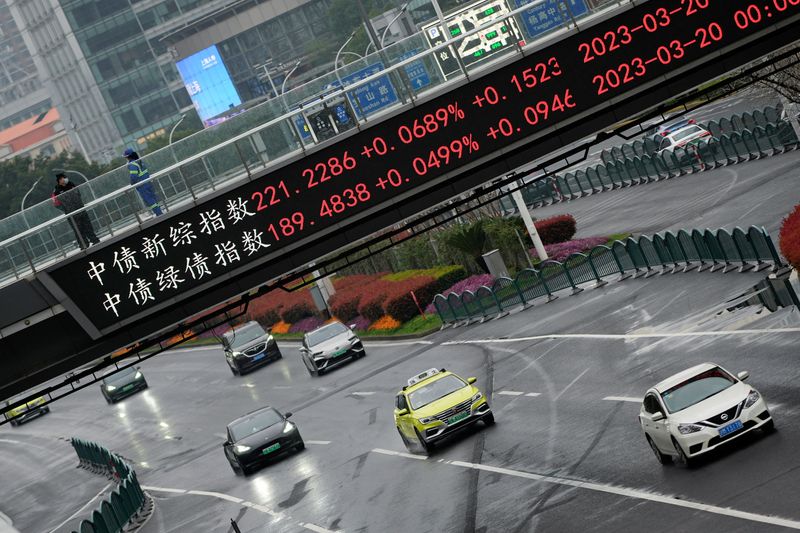By Samuel Shen and Summer Zhen
SHANGHAI/HONGKONG (Reuters) - Buy the state, sell the capitalist - that's how global investors are trying to play China's latest anti-graft crackdowns as they see private enterprise increasingly sidelined in Beijing's quest for "common prosperity".
China's recent sweep of the medical sector came as a shock to many investors who had thought the end of Beijing's three-year regulatory purge of the property and tech sectors meant there would be no more industry-wide crackdowns as policymakers prioritised economic recovery.
Several government bodies in July launched a year-long anti-corruption campaign into the medical system, making clear that China's drive to deliver affordable housing, education and healthcare to its masses was more important.
That forced many investors to quickly draw parallels with last year's crusade against private tutoring and a long-running one against tycoon Jack Ma's consumer finance firm Ant Group.
The one unanimous conclusion they came to was that Beijing wants a greater state presence in these sectors.
"The underlying principle is that healthcare is kind of like a social service that should principally be in state hands," said Arthur Kroeber, partner and head of research at Gavekal in New York. Kroeber says the crackdowns are about "defining what the state does, what the private sector does, and creating a more limited sandbox for the private sector to play in."
"This links to the idea of common prosperity because it's the state's job to guarantee a level of provision of basic services, whether it's education or healthcare, so it's important for the state to have a role," he said.
That has left investors now picking the state over the private sector.
While the CSI Medical Services Index is down 4.4% this month and 20% so far this year, investors have snapped up shares of state-owned medicine producers such as Beijing Tongrentang Co, which is up 14% this month.
Similarly, the expectation that state-backed property firms will gain better access to funding and bigger market share has seen investors dump private developers' stocks and rush into state-owned developers such as Yuexiu Property and Poly Developments.
Zhang Kexing, general manager of Beijing Gelei Asset Management, expects healthcare companies with strong branding will benefit, as will firms in traditional Chinese medicine, which has political support, such as Beijing Tongrentang.
NATIONAL SERVICE
While President Xi Jinping has made graft busting a priority since 2012, the Chinese Communist Party's (CCP) two-year-old "common prosperity" campaign that targets financial services, private education and healthcare has accelerated that push.
The CCP's July Politburo meeting reinforced the message, with the top policymaking body pledging to put a floor under the property sector, help indebted local governments heal and boost consumer demand.
Investors now believe Xi will be relentless in his social and economic agenda, much of which draws on Mao Zedong's Marxist and socialist thinking.
Thomas Masi, a partner and equity portfolio manager at Boston-based GW&K Investment Management, spoke to heads of several Chinese firms that he reckoned were at the fore of innovation in healthcare.
"Basically the message they were getting from the government was that they should be doing some of this innovation for national service, as opposed to for profitability only. That was a lightbulb for us," said Masi, who was once bullish on healthcare.
"We basically understood...we were not necessarily going to be paid as shareholders."
Xi himself has often said that private companies should be "rich and loving," be "patriotic" and share the fruits of their growth with employees more equitably.
Nuno Fernandes, also a partner and portfolio manager at GW&K, says it is important for investors in China to recognise the power of the state to override private interests, which means companies will need to "make a profit out of whatever circumstances and situation they are given."
That is why Fernandes has slashed his portfolio holdings in Chinese drugmakers.
Huang Yan, general manager of private fund manager Shanghai QiuYang Capital Co, said Beijing will crack down on any sector seen as increasing people's economic burden.
"Whether it's healthcare or tutoring, a crackdown will befall any sector as long as the campaign benefits the majority of people at the cost of the minority," Huang said.
Huang points to inflated liquor prices as an example.
"Using pricey spirit to lubricate business at the banquet increases companies' cost which could be used in better ways. It's possible for this sector to be targeted," he says.
But Beijing may ignore other sectors such as infrastructure, where such excess is less visible, he said.
Kumar Pandit, portfolio manager at Somerset Capital Management's Emerging Markets Dividend Growth Fund in London, is not cutting his China exposure but has an "added layer of scrutiny" around sectors Beijing deems important to common prosperity.

While the probability of wider crackdowns is low, he said making decisions remains challenging.
"It is difficult to say with certainty whether the crackdown will spill into other sectors," Pandit said.